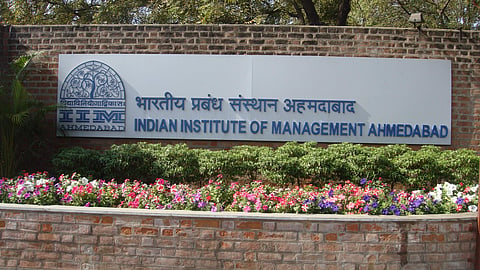IIMA opposes PIL seeking reservation for PhD programme, citing operational freedom
The Indian Institute of Management Ahmedabad (IIMA) has filed an affidavit in response to a public interest litigation (PIL) seeking reservation for PhD courses, stating that operational freedom is a fundamental aspect of the institute's identity. Despite being a statutory body under the IIM Act, 2017, IIMA maintains its autonomy and independence, receiving no funding from the government.
On Monday, January 16, the Gujarat High Court heard a case regarding a public interest litigation (PIL) filed seeking reservation for the Indian Institute of Management Ahmedabad's (IIMA) PhD programme. IIMA argued against the reservation, stating that the program is "super-specialised" and that neither the Indian Constitution nor any other laws provide for reservation for courses at such high levels of specialisation, according to a PTI report.
The PIL, filed by one Global IIM Alumni Network, has challenged the absence of reservation in the PhD programme, which was earlier known as the Fellow Programme in Management (FPM) course in IIMA. Further, the institute said, "IIMA was set up as an institution that would be managed by a society, the IIMA Society, created under the Societies Registration Act. IIMA was therefore conceived as a board-managed institution, free from the exclusive control of any one constituency. Thus, operational freedom is an integral part of the DNA of IIMA."
IIMA has consistently ranked as the premier management school in India, and its programmes are also ranked highly in several international rankings. "In 2008, IIMA became the first management school in the country to be awarded EQUIS accreditation by the EFMD (European Foundation for Management Development)," it said.
Further, it said that notified on January 11, 2018, the IIM Act of 2017 declared IIMA and other IIMs as the Institutes of National Importance, and each IIM is separate, independent and autonomous body corporates. In this regard, it said, "It is also required to be pointed out that all the IIMs governed by the IIM Act, continue to be independent and autonomous, governed by their Board of Governors. The overall superintendence, direction and control of the affairs of the institutes including the powers to frame policies/regulations lies with the BoG."
Moreover, it claimed that though IIMA is now a statutory body after the enactment of the IIM Act, "it continues to be an autonomous and independent institute with no funding from the government". Additionally, the institute further claimed that there was no illegality or breach of the provisions of the Constitution of India or other statutes in not providing for any reservation in its PhD programme, as stated in a report by PTI.
Even the candidates from the reserved category, by the time they reach the stage of applying for the PhD programmes, would have had the benefit of reservation policy at graduation and post-graduation level courses, it said. "Therefore, the law does not mandate any further reservation for such high-level specialisation programmes," it added.
Citing another reason, the institute said that the reservation of seats is also not possible due to the smaller number of seats that may be available for programmes like PhD/FPM coupled with the fact that there was no fixed number of seats. "There is no violation of the provisions of Central Education Institution (Reservation in Admission) Act, 2006 or Rights of Persons with Disabilities Act, 2016," it further added.


